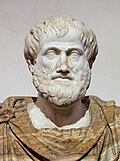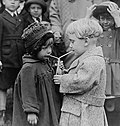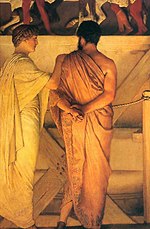is Rhetoric, the Art of Rhetoric, On Rhetoric, or a Treatise on Rhetoric. Aristotle is credited with developing the basics of a system of rhetoric that...
32 KB (3,961 words) - 07:08, 25 October 2024
discovering, and developing arguments for particular situations. Aristotle defined rhetoric as "the faculty of observing in any given case the available means...
141 KB (17,425 words) - 14:01, 2 November 2024
Pathos (category Philosophy of Aristotle)
discussed the different interpretations of Aristotle's views of rhetoric and his philosophy. Some believe that Aristotle may not have even been the inventor...
21 KB (2,787 words) - 03:34, 29 October 2024
Aristotle (Greek: Ἀριστοτέλης Aristotélēs; 384–322 BC) was an Ancient Greek philosopher and polymath. His writings cover a broad range of subjects spanning...
163 KB (17,767 words) - 19:20, 31 October 2024
oratory) is one of the three kinds of rhetoric described by Aristotle. Deliberative rhetoric juxtaposes potential future outcomes to communicate support...
3 KB (360 words) - 04:35, 26 August 2024
Ethos (category Rhetoric)
idea in a compelling way. The word's use in rhetoric is closely based on the Greek terminology used by Aristotle in his concept of the three artistic proofs...
30 KB (4,045 words) - 18:11, 20 October 2024
Public speaking (category Rhetoric)
Ancient Rome, where it was a fundamental component of rhetoric, analyzed by prominent thinkers. Aristotle, the ancient Greek philosopher, identified three...
46 KB (5,291 words) - 22:51, 4 November 2024
Epideictic (category Rhetoric)
or praise-and-blame rhetoric, is one of the three branches, or "species" (eidē), of rhetoric as outlined in Aristotle's Rhetoric, to be used to praise...
10 KB (1,427 words) - 04:36, 26 August 2024
Enthymeme (category Rhetoric)
enthymemes. (Rhetoric II.XX.1). Aristotle discusses two types of enthymemes: demonstrative [deiktika] and refutative [elentika or rézoi (ῥέζοι)]. (Rhetoric II.XXII...
10 KB (1,160 words) - 08:12, 24 October 2024
interest in philosophy, religion, and psychology. In Book II of Rhetoric, Aristotle defines kindness as "helpfulness towards someone in need, not in...
11 KB (1,128 words) - 01:37, 11 September 2024
Logos (category Rhetoric)
and deductive reasoning. Aristotle first systematized the usage of the word, making it one of the three principles of rhetoric alongside ethos and pathos...
38 KB (4,399 words) - 20:31, 25 October 2024
Aristotle's Poetics (Greek: Περὶ ποιητικῆς Peri poietikês; Latin: De Poetica; c. 335 BCE) is the earliest surviving work of Greek dramatic theory and...
37 KB (4,385 words) - 06:32, 25 October 2024
Classical unities (redirect from Aristotle's three unities)
with his own ideas on what he was able to glean from Aristotle's book, Rhetoric. In Rhetoric Aristotle considers the dramatic elements of action and time...
14 KB (1,952 words) - 15:05, 27 May 2024
Organon (redirect from Aristotle's logic)
appended to this list of works Aristotle's Rhetoric and Poetics. The Organon was used in the school founded by Aristotle at the Lyceum, and some parts...
16 KB (1,645 words) - 00:30, 29 October 2024
understood (logic) and being transmitted outwards as wisdom (rhetoric). Aristotle defined rhetoric as, "the power of perceiving in every thing that which is...
8 KB (822 words) - 21:58, 5 April 2024
Literary genre (section Aristotle)
in his treatises Rhetoric and Poetics. Genres are categories into which kinds of literary material are organized. The genres Aristotle discusses include...
10 KB (1,212 words) - 04:59, 7 September 2024
more artistically presented one. The Ancient Greek philosopher of rhetoric Aristotle and later the Roman rhetorician Quintilian were among the early documented...
16 KB (1,799 words) - 13:34, 28 September 2024
Inventio (redirect from Locus (rhetoric))
Aristotle's Rhetoric and topical schemes of Chaïm Perelman and Lucie Olbrechts-Tyteca's The New Rhetoric to illustrate major differences of rhetoric throughout...
21 KB (2,889 words) - 22:09, 9 March 2024
Forensic rhetoric, as coined in Aristotle's On Rhetoric, encompasses any discussion of past action including legal discourse—the primary setting for the...
8 KB (1,144 words) - 04:37, 26 August 2024
a source or message. Credibility dates back to Aristotle theory of Rhetoric. Aristotle defines rhetoric as the ability to see what is possibly persuasive...
26 KB (3,352 words) - 18:33, 29 October 2024
Rhetoric, Aristotle says, "proper method of delivery…affects the success of a speech greatly; but hitherto the subject has been neglected." Aristotle...
10 KB (1,502 words) - 15:20, 11 October 2023
These include ethos, pathos, and logos, all three of which appear in Aristotle's Rhetoric. Ethos (plural: ethea) is an appeal to the authority or credibility...
6 KB (828 words) - 00:07, 22 October 2024
The Education of a Christian Prince (section Rhetoric)
rhetoric and yield model Greek citizens and well-trained leaders. For Isocrates, writing was critical to rhetoric. Aristotle – In the Art of Rhetoric...
18 KB (2,371 words) - 13:00, 31 October 2024
of political philosophy by Aristotle, a 4th-century BC Greek philosopher. At the end of the Nicomachean Ethics, Aristotle declared that the inquiry into...
51 KB (7,048 words) - 22:12, 17 August 2024
themselves. Gorgias's primary occupation was as a teacher of rhetoric. According to Aristotle, his students included Isocrates. (Other students are named...
38 KB (5,018 words) - 07:16, 29 October 2024
Dispositio (redirect from Exordium (rhetoric))
guilt. Aristotle allowed that in practice most discourse also requires an introduction and a conclusion.[citation needed] Later writers on rhetoric, such...
9 KB (1,265 words) - 09:36, 6 February 2024
Aristotelian ethics (redirect from Ethics (Aristotle))
Aristotle first used the term ethics to name a field of study developed by his predecessors Socrates and Plato which is devoted to the attempt to provide...
35 KB (4,790 words) - 15:31, 21 June 2024
Philia (category Philosophy of Aristotle)
the way of inanimate objects could also "inanimately love". In his Rhetoric, Aristotle defines the activity involved in philia (τὸ φιλεῖν) as: wanting for...
11 KB (1,548 words) - 15:23, 13 October 2024
Aristotle Book II”, p. 40. Bhagavad-gītā, Chpt 12, V 15. Heller 2000, p. 33. Aristotle. "The ethics of Aristotle". WikiSource. Aristotle. "Rhetoric"...
26 KB (3,202 words) - 02:00, 1 October 2024













